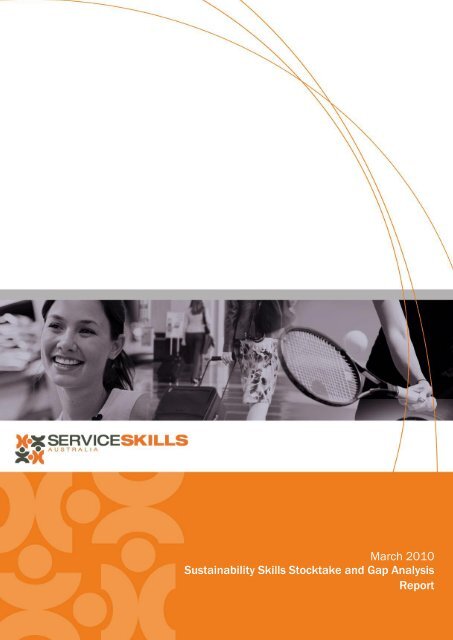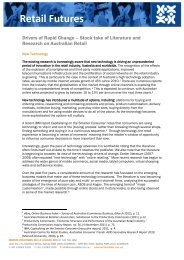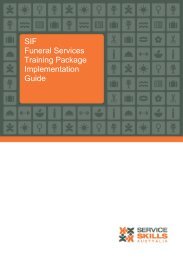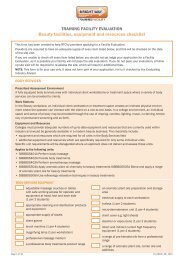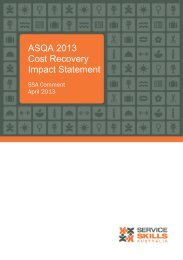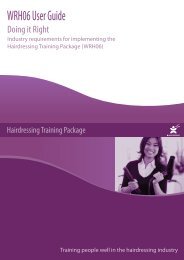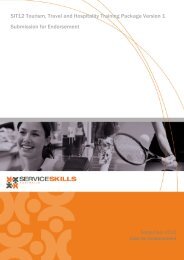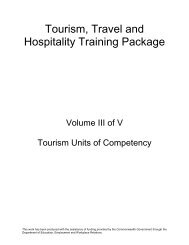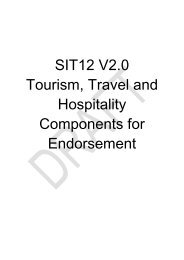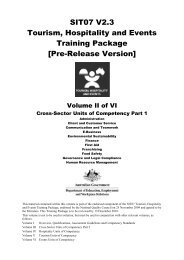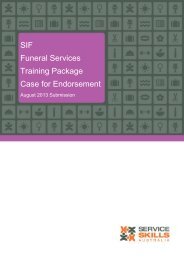Sustainability Skills Stocktake and Gap Analysis ... - Service Skills
Sustainability Skills Stocktake and Gap Analysis ... - Service Skills
Sustainability Skills Stocktake and Gap Analysis ... - Service Skills
Create successful ePaper yourself
Turn your PDF publications into a flip-book with our unique Google optimized e-Paper software.
March 2010<br />
<strong>Sustainability</strong> <strong>Skills</strong> <strong>Stocktake</strong> <strong>and</strong> <strong>Gap</strong> <strong>Analysis</strong><br />
Report
<strong>Service</strong> <strong>Skills</strong> Australia<br />
About <strong>Service</strong> <strong>Skills</strong> Australia<br />
<strong>Service</strong> <strong>Skills</strong> Australia (SSA) is the Industry <strong>Skills</strong> Council for the service industries. <strong>Skills</strong><br />
councils are the recognised national bodies providing advice on industry training <strong>and</strong><br />
skills development needs to government <strong>and</strong> industry.<br />
<strong>Service</strong> <strong>Skills</strong> Australia represents the interests of businesses across sectors including<br />
retail <strong>and</strong> wholesale, sport, fitness, community recreation, outdoor recreation, tourism,<br />
meetings <strong>and</strong> events, hospitality, restaurants <strong>and</strong> catering, caravans, hairdressing,<br />
beauty, floristry, community pharmacy <strong>and</strong> funeral services.<br />
<strong>Service</strong> <strong>Skills</strong> Australia supports skills development for the service industries by:<br />
providing industry intelligence <strong>and</strong> advice to <strong>Skills</strong> Australia, government <strong>and</strong><br />
enterprises on workforce development <strong>and</strong> skills needs;<br />
actively supporting the development, implementation <strong>and</strong> continuous<br />
improvement of high quality training <strong>and</strong> workforce development products <strong>and</strong><br />
services, including training packages. SSA currently manages a total of 10<br />
industry training packages (soon to be integrated into 7);<br />
providing independent skills <strong>and</strong> training advice to enterprises, including<br />
matching identified training needs with appropriate training solutions; <strong>and</strong><br />
working with enterprises, employment service providers, training providers <strong>and</strong><br />
government to allocate training places.<br />
Introduction<br />
<strong>Sustainability</strong> <strong>Skills</strong> <strong>Stocktake</strong> <strong>and</strong> <strong>Gap</strong> <strong>Analysis</strong> Report<br />
‘No economic system is sustainable unless it accommodates the ecosystems on which it<br />
depends.’ 1 . The health of our ecosystem is becoming recognised as essential to the<br />
ultimate health of our societies <strong>and</strong> our economies.<br />
The link between social, economic <strong>and</strong> environmental health is becoming increasingly<br />
seen as an interdependent one, <strong>and</strong> a holistic view of all three elements, as a central<br />
requirement to achieving sustainability.<br />
Australia‟s ability to effectively transition to a sustainable, low carbon economy is<br />
dependent on its ability to integrate the skills <strong>and</strong> values required for sustainable<br />
outcomes at the core of workplace practices. This report provides an analysis of how <strong>and</strong><br />
where sustainability skills are incorporated into the <strong>Service</strong> <strong>Skills</strong> Australia training<br />
packages. It also identifies gaps that relate to the work requirements <strong>and</strong> achievement of<br />
sustainable outcomes, in order to direct further work in this area.<br />
Project parameters<br />
1 http://www.gp.org/platform/2004/economics.html<br />
2
<strong>Sustainability</strong> <strong>Skills</strong> <strong>Stocktake</strong> <strong>and</strong> <strong>Gap</strong> <strong>Analysis</strong> Report<br />
In order to conduct a full analysis of the social sustainability of skill outcomes in training<br />
packages, one would need to assess the impact of jobs <strong>and</strong> their activity on social<br />
systems beyond those within the organisation. This would include assessing how they<br />
support human rights, labour rights <strong>and</strong> corporate governance 2 . Such an examination<br />
would be extensive, <strong>and</strong> outside what is considered to be the intention of this project.<br />
Likewise, an analysis of economic sustainability in training packages would require<br />
consideration of how an organisation impacts on <strong>and</strong> contributes to the economic<br />
sustainability of communities <strong>and</strong> the broader society.<br />
At best, an analysis could incorporate some of the underpinning skills which could<br />
support sustainable outcomes, such as communication, financial planning, working with<br />
others, literacy, social inclusion, working safely, managing finances <strong>and</strong> so on.<br />
However, given that protection of the environment, <strong>and</strong> accommodation of the<br />
ecosystems on which we depend underpins the health <strong>and</strong> sustainability of societies, it is<br />
appropriate to focus on the skills which will embed „green‟ <strong>and</strong> environmental sustainable<br />
practices into work operations.<br />
For example, a hotel objective to reduce environmental impact through work practices<br />
such as encouraging customers to reuse linen, reducing waste or recycling, serves the<br />
greater society by protecting the environment <strong>and</strong> supports the economic viability of all<br />
who depend on it.<br />
The incorporation of „green‟ skills <strong>and</strong> environmentally sustainable work practices in<br />
training packages has hence been the focus of this project <strong>and</strong> is understood to be the<br />
intention of work which aims to respond to the impacts of climate change, <strong>and</strong> transition<br />
to a sustainable, low carbon economy.<br />
<strong>Sustainability</strong> in the service industries<br />
The service industries play a pivotal role in the development of a sustainable society.<br />
They are critical components in product supply chains <strong>and</strong> their role in customer service<br />
makes them highly influential in procurement decisions <strong>and</strong> processes, <strong>and</strong> in building<br />
consumer awareness.<br />
SSA is conscious of this important position <strong>and</strong> has for many years, worked to embrace<br />
key underpinning skills into its training packages. Customer service, communication <strong>and</strong><br />
interpersonal skills, as well as ability in financial transactions, planning <strong>and</strong> management,<br />
have always been central to competency in the service industries <strong>and</strong> as such are already<br />
extensively covered in units <strong>and</strong> qualifications.<br />
However, the growing priority of environmental sustainability in today‟s climate indicates<br />
that a stronger focus on green skills is necessary for these industry training packages.<br />
SSA training packages include:<br />
2 http://en.wikipedia.org/wiki/Social_sustainability<br />
3
<strong>Service</strong> <strong>Skills</strong> Australia<br />
SIB10*<br />
Beauty Training Package<br />
SIF08<br />
Funeral <strong>Service</strong>s Training Package<br />
SFL10*<br />
Floristry Training Package<br />
SIR07<br />
Retail <strong>Service</strong>s Training Package<br />
SIS10*<br />
Sport, Fitness <strong>and</strong> Recreation Training Package<br />
SIT07<br />
Tourism, Hospitality <strong>and</strong> Events Training Package<br />
WRH06 V2<br />
Hairdressing Training Package<br />
* These training packages are in the final stages of a continuous improvement process<br />
<strong>and</strong> will be submitted for endorsement in 2010. The gap analysis has been conducted on<br />
these versions rather than the currently endorsed versions they will replace.<br />
Across the service industries, there are a range of key skills that impact on environmental<br />
outcomes. These include:<br />
Product knowledge – underst<strong>and</strong>ing the environmental credentials <strong>and</strong><br />
implications of product choices, <strong>and</strong> ability to communicate this information to<br />
customers <strong>and</strong> provide meaningful <strong>and</strong> accurate advice. Communication may<br />
involve labelling, marketing <strong>and</strong> promotional initiatives.<br />
Purchasing <strong>and</strong> procurement – establishing <strong>and</strong> implementing purchasing criteria<br />
to guide selection of products <strong>and</strong> services with less or neutral environmental<br />
impact. This includes ensuring the availability of sustainable options for<br />
customers <strong>and</strong> establishing supply chains to support sustainable outcomes.<br />
Planning <strong>and</strong> development – design <strong>and</strong> development of products, services,<br />
facilities <strong>and</strong> operations in a manner that considers <strong>and</strong> reduces environmental<br />
impact.<br />
Managing <strong>and</strong> monitoring – assessing ongoing environmental performance <strong>and</strong><br />
identifying areas for improvement.<br />
Developing <strong>and</strong> implementing workplace procedures – to reduce environmental<br />
impact through energy <strong>and</strong> resource efficient practices, waste minimisation,<br />
water conservation, recycling, reuse of materials etc.<br />
Leadership – modelling <strong>and</strong> encouraging behavioural change in both customers<br />
<strong>and</strong> staff.<br />
Most of these are ways of working which can easily be integrated into the skill <strong>and</strong><br />
knowledge requirements of current units. Within the service industries these most often<br />
4
<strong>Sustainability</strong> <strong>Skills</strong> <strong>Stocktake</strong> <strong>and</strong> <strong>Gap</strong> <strong>Analysis</strong> Report<br />
will add another consideration to the range of criteria. For example, product knowledge is<br />
already a requirement for competency across the retail sectors; environmental<br />
credentials are additional knowledge criteria to price, function, colour, origin, materials<br />
etc.<br />
In some cases there is a need for new skills which focus specifically on sustainability. For<br />
example, minimising the impact of work activity is an additional skill to performing the<br />
technical aspects of a skill; achieving sustainable l<strong>and</strong> management is a new skill; as is<br />
developing workplace policy <strong>and</strong> procedures for sustainability. Where st<strong>and</strong> alone „green‟<br />
sustainability skills are identified as being relevant to the industry, these are considered<br />
as specific unit needs.<br />
<strong>Sustainability</strong> skill requirements are seen to be those which are relevant to the specific<br />
work requirements, <strong>and</strong> reflect an appropriate level of responsibility. As such they differ<br />
from job to job <strong>and</strong> from industry to industry. The analysis undertaken for this report has<br />
involved an assessment of the specific „green‟ skill requirements for each industry sector<br />
at each qualification <strong>and</strong> work role outcome. It builds on the premise that all work<br />
conducted within the service industries includes some level of responsibility when it<br />
comes to supporting Australia‟s transition to a sustainable, low carbon economy.<br />
<strong>Skills</strong> for sustainability – an overview<br />
While the actual „green‟ skill requirements for units <strong>and</strong> qualifications must be<br />
considered in detail for each industry outcome, the broad levels of responsibility are<br />
relatively consistent across the SSA training packages.<br />
The Certificate I qualification targets an introductory or induction role <strong>and</strong> therefore<br />
incorporates a foundational underst<strong>and</strong>ing of the work environment <strong>and</strong> application of<br />
workplace procedures. <strong>Sustainability</strong> skills are most likely to be in the implementation of<br />
workplace procedures.<br />
At the Certificate II level, workers are following established procedures <strong>and</strong> their essential<br />
contribution will be in their willingness <strong>and</strong> accuracy in the application of these<br />
procedures, plus their participation in identifying <strong>and</strong> developing improvements as<br />
members of the work team. Ensuring these workers underst<strong>and</strong> the implications of<br />
sustainability drivers on their work activity, will be important to support this as a core<br />
value. Certificate II level workers in the service industries mostly play an assistant role<br />
<strong>and</strong> are responsible for conducting a sales <strong>and</strong> support service for customers. Limited<br />
product information may be required to support customer service <strong>and</strong> assist customers<br />
with decisions on purchases.<br />
At the Certificate III level, workers are making decisions on the suitability of products <strong>and</strong><br />
services to meet customer needs <strong>and</strong> providing information <strong>and</strong> advice. These people<br />
need to be able to interpret <strong>and</strong> relay information on the environmental credentials of<br />
products <strong>and</strong> services <strong>and</strong> identify <strong>and</strong> apply the most environmentally sustainable<br />
options. The high level of contact with customers requires strong communication <strong>and</strong><br />
interpersonal skills <strong>and</strong> ability to „sell‟ the environmental benefits of products <strong>and</strong><br />
services. Technical ability at this level requires ability to perform tasks with minimal<br />
impact to the environment, according to workplace requirements. The work role at this<br />
level may also include team leader responsibilities.<br />
5
<strong>Service</strong> <strong>Skills</strong> Australia<br />
Certificate IV, Diploma <strong>and</strong> above qualifications in these industries target technical,<br />
management <strong>and</strong> supervisory roles. These outcomes require ability to make decisions on<br />
workplace practice <strong>and</strong> procedures that will generate the most sustainable outcomes.<br />
They require an underst<strong>and</strong>ing of the factors involved in balancing social, financial <strong>and</strong><br />
environmental outcomes, relative to the work. These are leadership positions <strong>and</strong> require<br />
strong interpersonal skills to engage others to support sustainability initiatives. They are<br />
responsible for purchasing <strong>and</strong> managing supply chains, <strong>and</strong> establishing business<br />
marketing strategy <strong>and</strong> priorities. Accessing, analysing <strong>and</strong> providing information on<br />
products <strong>and</strong> services underpins service decisions. Work in these industries is labour<br />
intensive <strong>and</strong> ongoing sustainability relies on management skills incorporating motivation,<br />
conflict management, planning <strong>and</strong> team building.<br />
Skill for sustainability – a detailed analysis<br />
A thorough analysis of sustainability skills for each of the service industry sectors is<br />
provided by training package, in the remainder of this report.<br />
The findings are presented in a manner which identifies the „green‟ skill implications for<br />
the industry <strong>and</strong> for the qualification, reports where <strong>and</strong> how this is addressed, <strong>and</strong><br />
identifies gaps in required coverage.<br />
A mapping document, which further identifies unit level coverage in each training<br />
package is provided as Appendix A.<br />
6
<strong>Sustainability</strong> <strong>Skills</strong> <strong>Stocktake</strong> <strong>and</strong> <strong>Gap</strong> <strong>Analysis</strong> Report<br />
Hair <strong>and</strong> beauty industries<br />
<strong>Sustainability</strong> implications for the hair <strong>and</strong> beauty industries<br />
The hair <strong>and</strong> beauty industries employ over 84,000 people in approximately 18,300,<br />
mostly small businesses with less than 20 employees.<br />
The sustainability of these businesses is based on sound management <strong>and</strong> people skills<br />
to ensure they have the right technical <strong>and</strong> customer service skills, as well as strong<br />
ability in financial operations <strong>and</strong> marketing. These industries are highly competitive <strong>and</strong><br />
service an increasingly well-informed customer base that expects value for money <strong>and</strong> an<br />
increasing level of service.<br />
The success of each business is reliant on the quality of its staff <strong>and</strong> businesses need to<br />
ensure that the services they offer distinguish them from their competitors. Therefore, it<br />
is essential that staff have a thorough knowledge of products <strong>and</strong> services as well as the<br />
required skills to provide a high level of service. One of the issues that has emerged in<br />
SSA‟s research is the need for greater development of management <strong>and</strong> leadership skills,<br />
especially in the soft skill areas, in order to ensure that businesses can meet these<br />
customer expectations.<br />
The greening of these businesses provides many opportunities for competitive positioning<br />
<strong>and</strong> economic <strong>and</strong> social gain. Employees have extensive opportunity to engage<br />
customers during treatments, provide information about environmental credentials of the<br />
business <strong>and</strong>/or product range, influence purchase choice <strong>and</strong> also to model more<br />
environmentally friendly practices. Essential to this will be management <strong>and</strong> leadership<br />
ability to recognise market opportunities, identify real environmental improvements that<br />
can be made <strong>and</strong> support staff to implement appropriate workplace procedures.<br />
Key areas for improving sustainability outcomes for these industries include:<br />
Energy efficiency – especially the reduced use of energy, efficiency of appliances,<br />
design of operation <strong>and</strong> use of natural <strong>and</strong> efficient lighting, use of heating <strong>and</strong><br />
cooling systems<br />
Water conservation – including efficient use (especially in the spa sector)<br />
Pollution prevention – targeting chemicals used in make-up, hair products <strong>and</strong><br />
other treatments, use of aerosols<br />
Waste management – including disposal of chemicals <strong>and</strong> hazardous substances,<br />
use of recycling, reuse, use of biodegradable products<br />
Procurement – of natural <strong>and</strong> more environmentally friendly products (such as<br />
low ammonia hair colouring products), purchasing criteria based on<br />
environmental credentials of products, assessing product information, balancing<br />
economic factors of potentially more expensive products with other social,<br />
business <strong>and</strong> marketing benefits<br />
Modelling – of sustainable practices <strong>and</strong> use of sustainable products.<br />
7
<strong>Service</strong> <strong>Skills</strong> Australia<br />
<strong>Sustainability</strong> in the Beauty Training Package<br />
The Beauty Training Package is in the final stages of the continuous improvement cycle<br />
<strong>and</strong> will be submitted for endorsement in mid 2010 as the SIB10 Beauty Training<br />
Package. The proposed training package includes sustainability skills from the<br />
perspective of both individual tasks <strong>and</strong> management <strong>and</strong> incorporates concepts of<br />
sustainability across social, economic <strong>and</strong> environmental outcomes.<br />
It covers the functional areas of:<br />
Body services<br />
Facial services<br />
Hair reduction services<br />
Nail services<br />
Spa services<br />
Skin services<br />
Appendix A identifies where social, financial <strong>and</strong> environmental skills are incorporated<br />
into the units of competency within the new, draft Beauty Training Package.<br />
All qualifications within the Beauty Training Package include a range of key core skills in<br />
communication, customer service, conducting financial transactions <strong>and</strong> product<br />
knowledge. These are considered to be essential pillars of the service industries‟ core<br />
business <strong>and</strong> underpinning enabling skills for achieving organisational sustainability<br />
objectives.<br />
In addition all qualifications contain at a minimum, within the core unit structure, green<br />
skills in waste minimisation <strong>and</strong> disposal. Higher level qualifications (from Certificate III)<br />
also include skills in research <strong>and</strong> planning <strong>and</strong> decision making (from Certificate IV) for<br />
improving environmental sustainability outcomes.<br />
The new Diploma for Beauty Salon Management includes units that address soft skills in<br />
human resource related issues, in response to industry request for these skills.<br />
Typical inclusions of „green skills‟ can be found in the following performance criteria,<br />
range statement <strong>and</strong> st<strong>and</strong>-alone units.<br />
At the performance criteria level coverage includes:<br />
capturing environmental work practices:<br />
- SIBBFAS201A Demonstrate retail skin care products - Safely dispose of all<br />
treatment waste, to minimise negative environmental impacts according to<br />
workplace procedures.<br />
- SIBBBOS401A Provide body massage - Use energy, water <strong>and</strong> other<br />
resources efficiently during preparation <strong>and</strong> the subsequent treatment<br />
process to reduce negative environmental impacts. )<br />
- SIBBSPA501A Work in spa therapies - Ensure the safe disposal of waste<br />
according to relevant laws, regulations <strong>and</strong> workplace policies <strong>and</strong><br />
procedures<br />
capturing product knowledge on environmental credentials:<br />
- SIBBCCS302A Advise on beauty services Evaluate products <strong>and</strong> services or<br />
treatments according to type, environmental impact, client needs,<br />
characteristics <strong>and</strong> price range.<br />
8
<strong>Sustainability</strong> <strong>Skills</strong> <strong>Stocktake</strong> <strong>and</strong> <strong>Gap</strong> <strong>Analysis</strong> Report<br />
capturing sustainable decision making:<br />
- SIBBCCS405A Develop a treatment plan Consider the comparative negative<br />
environmental impacts of available products, equipment <strong>and</strong> services <strong>and</strong> plan to<br />
minimise these when designing treatments.<br />
One of the critical aspects of embedding sustainability values is the implementation of<br />
workplace practices which reflect environmental efficiency <strong>and</strong> protection practices.<br />
While these cannot be dem<strong>and</strong>ed of an employer, incorporating them into the range<br />
statement helps to increase awareness of these important activities.<br />
Examples of range statement coverage includes:<br />
Workplace policies <strong>and</strong> procedures may include: environmental controls<br />
In addition, the unit SIRXCLM001A Organise <strong>and</strong> maintain work areas, imported from the<br />
Retail <strong>Service</strong>s Training Package, incorporates workplace housekeeping, waste disposal<br />
<strong>and</strong> environmental protection practices, <strong>and</strong> is packaged as a core unit for Certificate II<br />
<strong>and</strong> III qualifications.<br />
Examples in the underpinning knowledge requirements include:<br />
SIBBRES201A Research <strong>and</strong> apply beauty industry information - Environmental<br />
responsibilities of the industry, including waste minimisation <strong>and</strong> recycling.<br />
The Beauty Training Package also includes coverage in st<strong>and</strong>-alone units. For example,<br />
the unit BSBSUS201A Participate in environmentally sustainable work practices is<br />
available in all qualifications as an elective unit except in the Diploma of Salon<br />
Management <strong>and</strong> the Vocational Graduate Certificate in Intense Pulsed Light <strong>and</strong> Laser<br />
Hair Reduction. These two qualifications include a specific sustainability unit Develop<br />
workplace policy <strong>and</strong> procedures for sustainability as a core requirement.<br />
<strong>Sustainability</strong> gaps in the Beauty Training Package<br />
While there are some excellent inclusions in the new draft training package, there are a<br />
few opportunities for improvement. For example, regulations / legislation descriptors in<br />
the range statement do not include environmental regulations (for example disposal of<br />
chemicals / hazardous substances)<br />
Workplace policies <strong>and</strong> procedures often do not include environmental references or may<br />
just list „environmental controls‟. As this is such an important aspect of sustainability it is<br />
suggested that the reference be strengthened, for example to:<br />
Workplace policies<br />
<strong>and</strong> procedures may<br />
include:<br />
Environmental protection practices such as:<br />
Waste minimisation<br />
Recycling<br />
Reuse<br />
Energy efficiency – e.g. electricity saving devices <strong>and</strong><br />
practices<br />
Waste disposal<br />
Resource management<br />
Water efficiency<br />
9
<strong>Service</strong> <strong>Skills</strong> Australia<br />
Other unit level gaps include:<br />
SIRXCLM001A Organise <strong>and</strong> maintain work areas. This is a key core unit for covering<br />
workplace practices <strong>and</strong> could be strengthened by addition of environmental protection<br />
activities or workplace procedures as noted above.<br />
SIBBNLS201A Work within a nail services framework <strong>and</strong> SIBBCCS404A Work within a<br />
skin therapies framework – are perfect units for introducing concepts of environmental<br />
impact in this industry but there are no references to it.<br />
SIBXRES501A Investigate new products <strong>and</strong> services should capture skill for assessing<br />
environmental credentials, yet there is nothing in this unit which references<br />
environmental impacts.<br />
SIRXRPK002A Recommend hair, beauty <strong>and</strong> cosmetic products <strong>and</strong> services should<br />
include in the range statement product knowledge reference: environmental labelling /<br />
information / credentials.<br />
SIB10 Beauty Training Package - IN SUMMARY<br />
The new SIB10 Beauty Training Package explicitly incorporates social, financial <strong>and</strong><br />
environmental skills within all qualifications. Minor improvements are suggested to<br />
strengthen specific unit applications.<br />
<strong>Sustainability</strong> in the WRH06 Hairdressing Training Package<br />
This training package is in the initial scoping phase of the continuous improvement cycle.<br />
To date, the inclusion of components addressing environmental sustainability has not<br />
been a priority area <strong>and</strong> as such, this current version has only minimal direct references<br />
to environmental sustainability skills. This will be a key consideration in work being<br />
undertaken now in the improvement of this training package.<br />
Key areas for environmental outcomes include sustainability in workplace practices – i.e.<br />
waste disposal, energy efficiency, water conservation, <strong>and</strong> procurement <strong>and</strong> use of<br />
products which minimise environmental impact. Efficiency of facilities <strong>and</strong> development<br />
of workplace procedures are also issues for leadership <strong>and</strong> owner/manager positions.<br />
The core unit WRHCS207A Develop hairdressing industry knowledge (Certificate II only),<br />
references issues of concern as environmental <strong>and</strong> social <strong>and</strong> may require knowledge of<br />
environmental responsibilities of the industry, including waste minimisation <strong>and</strong> recycling.<br />
WRHCS204A Maintain <strong>and</strong> organise work areas is a core unit at Certificate II <strong>and</strong> III <strong>and</strong><br />
covers waste disposal at the performance criteria level (Waste is promptly removed <strong>and</strong><br />
disposed of according to workplace policy <strong>and</strong> legislative requirements) <strong>and</strong> as required<br />
knowledge.<br />
Units covering haircutting skills include performance criteria addressing the disposal of<br />
waste according to relevant legislation <strong>and</strong> workplace policies <strong>and</strong> procedures.<br />
10
<strong>Sustainability</strong> <strong>Skills</strong> <strong>Stocktake</strong> <strong>and</strong> <strong>Gap</strong> <strong>Analysis</strong> Report<br />
<strong>Sustainability</strong> gaps in the Hairdressing Training Package<br />
At present it appears that gaining qualifications in hairdressing is most likely not to<br />
include a fundamental underst<strong>and</strong>ing of the implications of sustainability for the<br />
hairdressing industry.<br />
Coverage of waste disposal is included in some of the hairdressing units however this<br />
does not appear to be consistent throughout the training package, <strong>and</strong> generally does not<br />
consider the disposal implications of chemical products used in hairdressing services.<br />
The three environmental sustainability units which are available in most other<br />
qualifications within <strong>Service</strong> <strong>Skills</strong> training packages, <strong>and</strong> cover implementation <strong>and</strong><br />
development of sustainable workplace practices, are not accessible in any of the<br />
hairdressing qualifications. These areas are not adequately covered by alternative or<br />
specialised hairdressing units.<br />
WRHSM501A Manage hairdressing services <strong>and</strong> sales delivery does not reference<br />
sustainability issues at all <strong>and</strong> there appears no guaranteed coverage of sustainability for<br />
industry leaders in the current packaging rules. WRHWP302A Operate effectively as a<br />
hairdresser in a salon work team mentions minimising waste in the descriptor but not in<br />
the body of unit requirements.<br />
Legislation which addresses environmental concerns such as disposal of chemicals etc.<br />
is not included in range statement references <strong>and</strong> environmentally sustainable workplace<br />
practices are not incorporated into workplace procedures.<br />
<strong>Skills</strong> that support development of sustainable procurement <strong>and</strong> supply chain practices<br />
<strong>and</strong> assessment <strong>and</strong> improvement of business facilities <strong>and</strong> practices, would also help to<br />
improve sustainability of industry outcomes.<br />
WRH06 v 2 Hairdressing Training Package - IN SUMMARY<br />
The Hairdressing Training Package requires a complete review of units to ensure that the<br />
environmental implications of the industry are understood <strong>and</strong> that work practices are<br />
developed <strong>and</strong> implemented at all levels to minimise <strong>and</strong> address these impacts.<br />
Changes to the packaging rules are also required to enable access to specialised<br />
sustainability units <strong>and</strong> to ensure all outcomes are able to contribute to addressing<br />
sustainability issues for this industry.<br />
11
<strong>Service</strong> <strong>Skills</strong> Australia<br />
Funeral services industry<br />
<strong>Sustainability</strong> implications for the funeral industry<br />
The funeral services industry in Australia consists of different types of businesses<br />
providing services <strong>and</strong> products to members of the Australian community dealing with<br />
death <strong>and</strong> bereavement.<br />
There are approximately 820 businesses (funeral directors, crematoria <strong>and</strong> cemeteries)<br />
employing approximately 6,000 people. The funeral directors industry has traditionally<br />
been structured around family owned <strong>and</strong> operated private companies with the majority<br />
of businesses employing between one to ten staff.<br />
Implications for sustainability in the funeral industry includes providing an important<br />
community service at a time of grief <strong>and</strong> vulnerability in a manner that is sensitive to<br />
cultural <strong>and</strong> religious needs in a cost efficient manner. Funeral services also have a direct<br />
impact on the environment through the use of l<strong>and</strong> space for burials <strong>and</strong> final placement<br />
of remains. Issues of overcrowding in cemeteries, ongoing maintenance costs <strong>and</strong> site<br />
disrepair are key concerns in establishing sustainable outcomes in the long term.<br />
<strong>Sustainability</strong> initiatives in the funeral industry include the development of natural<br />
woodl<strong>and</strong>s or parkl<strong>and</strong> areas which support diverse ecological systems <strong>and</strong> planting of<br />
trees instead of tombstones. These signify a new approach to l<strong>and</strong> management,<br />
l<strong>and</strong>scaping <strong>and</strong> maintenance work requirements. Use of biodegradable coffins or urns<br />
<strong>and</strong> energy efficient practices are also entering work systems.<br />
<strong>Sustainability</strong> in the Funeral Training Package<br />
This training package contains a small number of units with a potentially large<br />
environmental impact as they involve work with a direct impact on the environment. As<br />
such, these units already encompass environmental considerations such as adherence to<br />
the Environmental Protection Act; waste disposal; water tables <strong>and</strong> water quality<br />
protection; non-compacted soil; the clearing of work area; <strong>and</strong> the disposal or recycling of<br />
materials according to a project environmental management plan.<br />
SIFOHS004A Work in confined spaces includes the performance criteria: Identify, confirm<br />
<strong>and</strong> apply environmental protection requirements according to project environmental<br />
management plan. These requirements may include: organisational or project<br />
environmental management plan, waste management, water quality protection, noise,<br />
vibration, dust <strong>and</strong> clean-up management.<br />
SIFOHS007A Identify hazards <strong>and</strong> assess risks in a cemetery or crematorium includes<br />
coverage of environmental hazards such as: water levels, seepage from neighbouring<br />
gravesites, high water tables, non-compacted soil, <strong>and</strong> biological hazards.<br />
SIFMWK017A Design a mortuary includes requirement to: Identify <strong>and</strong> assess physical<br />
characteristics of the space in relation to its capacity to meet operational mortuary<br />
requirements; <strong>and</strong> assess safety <strong>and</strong> environmental issues that may impact on the<br />
organisation of space.<br />
12
<strong>Sustainability</strong> <strong>Skills</strong> <strong>Stocktake</strong> <strong>and</strong> <strong>Gap</strong> <strong>Analysis</strong> Report<br />
Developing recommendations in mortuary design requires good underst<strong>and</strong>ing of<br />
sustainability <strong>and</strong> may include:<br />
- energy efficiency measures<br />
- waste disposal measures<br />
- implementation of design<br />
- feasibility studies<br />
- funding options<br />
- improvements to quality of employees‟ workspace<br />
- refurbishment<br />
- fit-out<br />
- new building<br />
- l<strong>and</strong>scape design<br />
- space use <strong>and</strong> allocation<br />
- relocation.<br />
A range of units include coverage of the Environment Protection Act <strong>and</strong> the identification<br />
of potential or actual breaches of relevant legislation or workplace policies <strong>and</strong><br />
procedures.<br />
These include skill areas which are involved with environmental works such as:<br />
SIFBCR010A Supervise burials<br />
SIFBCR014A Supervise cremations<br />
SIFBCR017A Prepare for gravedigging<br />
SIFBCR018A Backfill <strong>and</strong> make good graves<br />
SIFBCR019A Coordinate burial works<br />
SIFBCR026A Manage lift <strong>and</strong> reposition or deepen operations<br />
SIFBCR005A Install burial vaults includes element requirements to Install drainage<br />
provisions, Install sub-base material, Install waterproof membrane, Place <strong>and</strong> finish<br />
concrete, Use appropriate curing agent - all direct environmental works with potential<br />
impacts on environmental outcomes. However, the unit focuses on the technical skill<br />
without reference to the implications of work on the environment or the<br />
implementation of environmentally sustainable workplace practices.<br />
SIFBCR001A Coordinate burial site preparation <strong>and</strong> Reinstatement has direct impact<br />
on the environment but does not include any references.<br />
SIFBGM001A Provide general grounds care requires skill to Remove <strong>and</strong> dispose of<br />
weeds according to workplace policies <strong>and</strong> procedures, <strong>and</strong> Treat dead, diseased <strong>and</strong><br />
damaged plants according to supervisor instructions <strong>and</strong> workplace policies <strong>and</strong><br />
procedures. Knowledge requirements include types <strong>and</strong> characteristics of annual <strong>and</strong><br />
perennial weeds, water <strong>and</strong> general health requirements of plants <strong>and</strong> chemical <strong>and</strong><br />
non-chemical weed treatment control measures.<br />
SIFBGM003A Clean <strong>and</strong> maintain public conveniences <strong>and</strong> Amenities includes use<br />
<strong>and</strong> disposal of chemicals <strong>and</strong> waste.<br />
13
<strong>Service</strong> <strong>Skills</strong> Australia<br />
SIFBGM006A Evaluate building <strong>and</strong> grounds maintenance <strong>and</strong> development needs<br />
includes requirement to assess building <strong>and</strong> grounds development proposals to<br />
determine sustainability of development; <strong>and</strong> knowledge of sustainability principles.<br />
<strong>Sustainability</strong> gaps in the Funeral Training Package<br />
Environmental sustainability is covered to some extent through individual units, especially<br />
for those skills which directly impact on the environment. However there is a notable gap<br />
in the implementation <strong>and</strong> development of workplace practices which incorporate<br />
environmental considerations. In addition, it is not guaranteed under the current<br />
packaging, that all qualification outcomes include sustainability skills.<br />
SIFIND001A Work effectively in the funeral services industry is a core unit in all<br />
qualifications which could be strengthened to improve this. The range statement refers to<br />
information requirements which may include social <strong>and</strong> environmental issues <strong>and</strong><br />
requirements. However, apart from this there are no references to sustainability issues,<br />
legislation or work practices. This unit could offer all qualifications coverage in<br />
sustainability implications for the industry.<br />
In addition, the three environmental sustainability units which are listed in most other<br />
qualifications within <strong>Service</strong> <strong>Skills</strong> training packages, <strong>and</strong> cover implementation <strong>and</strong><br />
development of sustainable workplace practices, are only accessible through the<br />
importation rule (allowing one unit in total per qualification).<br />
Further coverage is also lacking in work conducted with clients, for example in providing<br />
environmental information <strong>and</strong> / or more sustainable options. SIFCCS001A Provide<br />
service to clients requires the identification of implications of options <strong>and</strong> solutions for<br />
clients <strong>and</strong> workplace which include negative impact on business reputation, costs,<br />
cultural implications, but does not include negative impact on environment.<br />
Other units which could incorporate environmental considerations do not reference<br />
sustainability or environmental issues at all.<br />
This includes those concerned with leadership, for example:<br />
SIFFNL008A Coordinate funeral operations<br />
SIFMWK004A Coordinate mortuary operations<br />
SIFMGT003A Supervise staff<br />
<strong>and</strong> performance monitoring:<br />
SIFGLC004A Monitor contracted services <strong>and</strong> supplies<br />
SIFGLC003A Conduct internal quality audits<br />
Furthermore, given the new interest in sustainability, higher level skills in examining the<br />
industry impact as a whole, including looking at the role of l<strong>and</strong> use <strong>and</strong> burial options,<br />
<strong>and</strong> reduced maintenance requirements <strong>and</strong> costs, could also support improved<br />
sustainability outcomes for the funeral services industry.<br />
14
<strong>Sustainability</strong> <strong>Skills</strong> <strong>Stocktake</strong> <strong>and</strong> <strong>Gap</strong> <strong>Analysis</strong> Report<br />
SIF08 Funeral Training Package - IN SUMMARY<br />
The SIF08 Funeral <strong>Service</strong>s Training Package at present does not consistently embed<br />
sustainability skills <strong>and</strong> values through units or qualification outcomes. For the most part,<br />
further information in range statements, for example in workplace practices <strong>and</strong><br />
procedures, will help to lift this coverage. However specific skill gaps in developing,<br />
implementing <strong>and</strong> monitoring sustainable work practices will require access to additional<br />
elements <strong>and</strong> units.<br />
15
<strong>Service</strong> <strong>Skills</strong> Australia<br />
Retail <strong>Service</strong>s<br />
<strong>Sustainability</strong> implications for the retail, wholesale, floristry <strong>and</strong> community<br />
pharmacy industries<br />
The retail <strong>and</strong> wholesale industries comprise almost 244,500 mostly small <strong>and</strong> medium<br />
sized businesses. They include supermarkets, department stores, discount department<br />
stores, specialty chains, commission-based retail <strong>and</strong> convenience stores. Floristry is also<br />
dominated by small businesses with less than 20 employees employed over 2466<br />
businesses. Together, the retail, wholesale <strong>and</strong> floristry industries employ more than 1.4<br />
million people <strong>and</strong> contribute approximately AUD112 billion to Australia‟s gross domestic<br />
product.<br />
The community pharmacies industry is also incorporated within the broader retail<br />
services industry. This industry sector employs approximately 46,000 people in 5,046<br />
mainly small to medium sized businesses.<br />
These industries are positioned at the centre of sustainability issues. Consumption,<br />
driven by social expectation <strong>and</strong> aspiration, is at the heart of our economy <strong>and</strong> at the<br />
source of the current dem<strong>and</strong> on the environment‟s natural resources. Turning around<br />
society‟s unsustainable consumption, is one of the key challenges to improving<br />
sustainability outcomes <strong>and</strong> responding to the impacts of climate change.<br />
As individuals, organisations <strong>and</strong> governments are driven to improve their environmental<br />
footprint, they will dem<strong>and</strong> products <strong>and</strong> services with better environmental credentials<br />
<strong>and</strong> also greater access to information on where products are sourced <strong>and</strong> how they are<br />
made. Consumers will increasingly be driven to rethink their purchases in accordance<br />
with sustainable values <strong>and</strong> seek out more sustainable options. Retail <strong>and</strong> wholesale<br />
businesses play a pivotal role in the dissemination of information to support this process<br />
<strong>and</strong> in the greening of supply chains.<br />
In the long term, proactively engaging this sustainability agenda will be part of<br />
maintaining business viability for these industries.<br />
Key areas for improving sustainability outcomes for these industries include:<br />
Development <strong>and</strong> implementation of sustainable work practices that address<br />
energy efficiency, water conservation, pollution prevention <strong>and</strong> waste<br />
management<br />
Procurement of products <strong>and</strong> services with positive environmental credentials<br />
Waste management– including disposal of chemicals <strong>and</strong> hazardous substances,<br />
recycling, reuse, selection of biodegradable products<br />
Modelling – of sustainable practices <strong>and</strong> use of sustainable products<br />
Development of sustainable supply chains including sourcing <strong>and</strong> ensuring the<br />
availability of green product choices for customers<br />
Provision of product information to support sustainable consumer decisions<br />
Engaging customers in determining sustainable practices that increase value<br />
rather than consumption<br />
Promotion of sustainability practices <strong>and</strong> marketing the sustainability features of<br />
the business <strong>and</strong> its products <strong>and</strong> services – this includes development of<br />
environmental concept stores<br />
16
<strong>Sustainability</strong> <strong>Skills</strong> <strong>Stocktake</strong> <strong>and</strong> <strong>Gap</strong> <strong>Analysis</strong> Report<br />
Engaging staff in sustainability initiatives.<br />
It is important to note that these industries provide first jobs for many Australians <strong>and</strong><br />
therefore are instrumental in setting a foundation for basic work related skills. As such,<br />
sustainability skills must be incorporated from entry level.<br />
Industry sectors also have specific conditions which influence skills needs for achieving<br />
sustainability.<br />
Community pharmacy businesses provide a continuum of care that includes product<br />
information, health education <strong>and</strong> medication management. As such, product information<br />
knowledge <strong>and</strong> skills in explaining product features <strong>and</strong> options, is especially important<br />
at all levels for this industry. It is also less likely that environmental credentials will rate<br />
highly over health benefit in the customers‟ product selection.<br />
Stock control <strong>and</strong> waste minimisation <strong>and</strong> disposal are particularly important in retail <strong>and</strong><br />
wholesale food outlets due to the short shelf life of products <strong>and</strong> potentially high waste<br />
levels which can occur with poor management.<br />
Floristry requires application of additional technical skill in the use of raw materials <strong>and</strong><br />
the development of floristry products.<br />
<strong>Sustainability</strong> in the Retail <strong>Service</strong>s Training Package<br />
This training package is in the initial scoping phase of the continuous improvement cycle.<br />
To date, the inclusion of components addressing environmental sustainability has not<br />
been a priority area <strong>and</strong> as such, this current version has only minimal direct references<br />
to environmental sustainability skills. This will be a key consideration in work being<br />
undertaken now in the improvement of this training package.<br />
In particular, in order to ensure „green‟ work outcomes, sustainability skills for people<br />
working across the retail, wholesale <strong>and</strong> community pharmacy sectors need to focus on:<br />
workplace practices<br />
product knowledge<br />
supply chain management <strong>and</strong><br />
leadership.<br />
References to these skills is made in some of the units with regards to waste<br />
minimisation (especially in the food preparation area) <strong>and</strong> to legislative requirements<br />
which include environmental protection. A sample of specific units from the training<br />
package which incorporate environmental sustainability are identified in Appendix A.<br />
<strong>Sustainability</strong> gaps in the Retail <strong>Service</strong>s Training Package<br />
Currently it is not guaranteed that all qualifications dem<strong>and</strong> a basic underst<strong>and</strong>ing of<br />
sustainability or skills in implementing sustainable practices. In order to address this,<br />
these need to be integrated into requirements both at the m<strong>and</strong>atory (core) level <strong>and</strong><br />
also within individual units.<br />
17
<strong>Service</strong> <strong>Skills</strong> Australia<br />
At the core level, this could be achieved through the importation of a st<strong>and</strong> alone<br />
sustainability unit (such as BSBSUS201A Participate in environmentally sustainable<br />
workplace practices) or by incorporating coverage within SIR units.<br />
All qualifications in the Retail <strong>Service</strong>s Training Package include two core units which<br />
could provide a basis of skill <strong>and</strong> knowledge for sustainable practice. SSA is aware of<br />
industry feedback that an introductory coverage of fundamental principles of<br />
sustainability in retailing is important for all outcomes. It is possible that these units could<br />
be used to achieve this.<br />
SIRXCLM001A Organise <strong>and</strong> maintain work areas, targets application of „workplace<br />
policies, legislative requirements <strong>and</strong> manufacturer instructions in order to use tools,<br />
chemicals <strong>and</strong> equipment for the safe <strong>and</strong> efficient cleaning, organisation <strong>and</strong><br />
maintenance of work areas‟. Currently this unit references waste disposal <strong>and</strong> meeting<br />
environmental protection legislative requirements. With some further work, this unit could<br />
also incorporate sustainability priorities such as waste minimisation <strong>and</strong> energy efficiency<br />
practices, <strong>and</strong> fundamental principles of sustainability in retailing.<br />
This unit is widely used across SSA‟s training packages <strong>and</strong> therefore offers an effective<br />
platform for ensuring skills across these industries.<br />
SIRXGLC003A Comply with legislative requirements affecting business activities<br />
(packaged from Certificate II) covers legislative requirements of environmental protection,<br />
waste disposal, <strong>and</strong> h<strong>and</strong>ling of hazardous substances. This unit targets safety, diversity,<br />
security <strong>and</strong> legislation, however is less direct about environmental sustainability<br />
responsibilities.<br />
Another unit widely packaged as a core requirement across SSA training packages is<br />
SIRXIND001A Work effectively in a retail environment. This unit covers many of the<br />
aspects of sustainability such as workplace culture, being responsible <strong>and</strong> nondiscriminatory,<br />
accessing information <strong>and</strong> underst<strong>and</strong>ing the work role, <strong>and</strong> following<br />
instructions, however environmental aspects are not mentioned. This unit may provide a<br />
suitable opportunity for ensuring that concepts of environmental sustainability <strong>and</strong> their<br />
application in the retail industry are addressed for all retail service outcomes.<br />
Similarly, the additional core unit for the wholesale qualifications, SIRWIND001A Confirm<br />
wholesale business practices, currently does not raise the issue of sustainability or<br />
considerations for supply chains, <strong>and</strong> could be strengthened in order to ensure<br />
awareness is achieved across this sector.<br />
Addressing sustainability skills within the core will also ensure coverage within the<br />
community pharmacy sector. Sector specific units tend to focus on the medical (<strong>and</strong><br />
social) implications of services <strong>and</strong> have less opportunity to specify environmental<br />
considerations relevant to providing health-related products.<br />
Other specific units which do not consistently incorporate sustainability (particularly<br />
environmental aspects) require at a minimum, reference to environmental considerations<br />
in range statements <strong>and</strong> required knowledge sections. For example, underst<strong>and</strong>ing of<br />
customer needs may include a need for information on environmental credentials <strong>and</strong><br />
availability of sustainable products; product information may include information on<br />
environmental impacts, disposal or biodegradability; features <strong>and</strong> benefits may include<br />
sustainability or reduced environmental impact, carbon neutral, organic, natural etc.;<br />
workplace practices may include energy efficient practices, water conservation or waste<br />
minimisation.<br />
18
<strong>Sustainability</strong> <strong>Skills</strong> <strong>Stocktake</strong> <strong>and</strong> <strong>Gap</strong> <strong>Analysis</strong> Report<br />
There are also some roles within retail services which will draw on specific skills in<br />
sustainability. These include assessing <strong>and</strong> monitoring the business performance against<br />
sustainability criteria <strong>and</strong> targets, developing <strong>and</strong> implementing sustainability criteria for<br />
supply chain management <strong>and</strong> developing organisational work practices which direct<br />
workplace activity in line with sustainability values. Management practices, business<br />
planning <strong>and</strong> marketing strategy must also more explicitly embed sustainability values<br />
<strong>and</strong> considerations.<br />
In some of these cases, units are available for importation into qualifications. For<br />
example the unit BSBSUS501A Develop workplace policy <strong>and</strong> procedures for<br />
sustainability would be suitable for business managers/owners. In other cases, it is likely<br />
that new st<strong>and</strong> alone units are required to fill these skill gaps. Specific needs will be<br />
further examined during the training package continuous improvement project currently<br />
underway.<br />
Other skills which require application within a sustainability framework include those<br />
covering merch<strong>and</strong>ising <strong>and</strong> specialist product knowledge units. Product Knowledge units<br />
need to be looked at in the range statements etc. as not all refer to “environmental<br />
consideration <strong>and</strong> recycled products”. There needs to be consistency in the use of<br />
“environmental” terminology.<br />
All merch<strong>and</strong>ising units also need to be reviewed in terms of sustainability <strong>and</strong> green<br />
skills. These need to be looked at as there is no mention at all in any of the units<br />
regarding such things as environmental products, environmental considerations, <strong>and</strong><br />
aspects of lighting energy efficiency.<br />
SIR07 Retail <strong>Service</strong>s Training Package - IN SUMMARY<br />
The Retail <strong>Service</strong>s Training Package at present does not consistently embed<br />
sustainability skills <strong>and</strong> values through units or qualification outcomes. For the most part,<br />
further information in range statements will help to lift this coverage however specific<br />
skill gaps in developing, implementing <strong>and</strong> monitoring sustainable work practices will<br />
require additional elements <strong>and</strong> units. Exploration of what sustainability means <strong>and</strong> how<br />
to introduce the principles of sustainable retailing also needs to be covered at all levels.<br />
This work will be one of the areas that will be addressed in the current continuous<br />
improvement project.<br />
<strong>Sustainability</strong> in the Floristry Training Package<br />
The Floristry Training Package is in the final stages of the continuous improvement cycle<br />
<strong>and</strong> will be submitted for endorsement in mid 2010 as SFL10 Floristry Training Package.<br />
The proposed training package includes sustainability skills from the perspective of both<br />
individual tasks <strong>and</strong> management <strong>and</strong> incorporates concepts of sustainability across<br />
social, economic <strong>and</strong> environmental outcomes.<br />
Successful completion of the new floristry qualification will require knowledge of the<br />
environmental impact of constructing <strong>and</strong> maintaining floristry products, <strong>and</strong> awareness<br />
of practices which minimise their impact, especially those that relate to energy use.<br />
Knowledge is also required of correct <strong>and</strong> environmentally sound disposal methods for all<br />
19
<strong>Service</strong> <strong>Skills</strong> Australia<br />
types of waste, in particular hazardous substances, spoiled <strong>and</strong> diseased flower <strong>and</strong><br />
plant materials, <strong>and</strong> those with a propensity to propagate weeds. Safe use of hazardous<br />
substances, such as cleaning <strong>and</strong> conditioning agents <strong>and</strong> preservatives, is also required.<br />
<strong>Sustainability</strong> coverage in the floristry units is detailed in Appendix A. Examples include:<br />
SFLSOP004A Prepare <strong>and</strong> care for floristry stock. This core unit is packaged in all<br />
qualification outcomes <strong>and</strong> covers sustainability at many levels. This includes elements<br />
<strong>and</strong> performance criteria – „Reduce negative environmental impacts‟, „Use energy, water<br />
<strong>and</strong> other resources efficiently when cleaning, preparing <strong>and</strong> maintaining stock to reduce<br />
negative environmental impacts‟ <strong>and</strong> „Safely dispose of all spoilt stock <strong>and</strong> waste,<br />
especially hazardous substances, to minimise negative environmental impacts‟. Required<br />
knowledge includes:<br />
the environmental impacts of cleaning premises, preparing <strong>and</strong> maintaining floristry<br />
stock <strong>and</strong> minimal impact practices to reduce these especially those that relate to<br />
resource, water <strong>and</strong> energy use<br />
correct <strong>and</strong> environmentally sound disposal methods for all types of waste <strong>and</strong> in<br />
particular for hazardous substances, spoiled <strong>and</strong> diseased flower <strong>and</strong> plant materials<br />
<strong>and</strong> those that have a propensity to propagate weeds.<br />
SFLDEC001A Design floristry products is a core unit for qualifications from Certificate III<br />
level. It includes coverage at performance criteria level „Consider negative environmental<br />
impacts of all materials <strong>and</strong> techniques used <strong>and</strong> minimal impact practices to reduce<br />
these‟ <strong>and</strong> in required knowledge:<br />
the environmental impacts of constructing <strong>and</strong> maintaining floristry products <strong>and</strong><br />
minimal impact practices to reduce these especially those that relate to resource,<br />
water <strong>and</strong> energy use <strong>and</strong> to the use of floristry raw materials.<br />
<strong>and</strong> the range statement:<br />
problems may include: negative environmental impacts of materials chosen.<br />
Other performance criteria examples include:<br />
Use energy, water <strong>and</strong> other resources efficiently when cleaning to reduce negative<br />
environmental impacts (SFLDEC007A Maintain floristry tools <strong>and</strong> equipment);<br />
Consider negative environmental impacts <strong>and</strong> minimal impact practices to reduce<br />
these (SFLDEC005A Style & manage an event);<br />
The unit BSBSUS201A Participate in environmentally sustainable workplace practices is<br />
also packaged as an elective for Certificate II <strong>and</strong> III qualifications.<br />
Leadership in sustainability is covered within higher level skills for example:<br />
Consider issues relating to product life cycle (element within unit: SFLSOP009A<br />
Research, assess <strong>and</strong> develop a floristry product range);<br />
<strong>and</strong> through the importation of the following elective units from Certificate IV <strong>and</strong> Diploma<br />
qualifications:<br />
BSBSUS301A Implement <strong>and</strong> monitor environmentally sustainable workplace<br />
practices <strong>and</strong> BSBSUS501A Develop workplace policy <strong>and</strong> procedures for<br />
sustainability.<br />
20
<strong>Sustainability</strong> <strong>Skills</strong> <strong>Stocktake</strong> <strong>and</strong> <strong>Gap</strong> <strong>Analysis</strong> Report<br />
<strong>Sustainability</strong> gaps in the Floristry Training Package<br />
While sustainability is covered extensively throughout the Floristry Training Package,<br />
there are two key units which could be strengthened in the provision of environmental<br />
information.<br />
SFLSOP007A Sell floristry products - Specific customer needs in the range statement<br />
could also include environmental credentials/impact of floristry product / service.<br />
SFLSOP001A Source information on floristry products <strong>and</strong> services – this unit is a<br />
core unit in all floristry qualifications <strong>and</strong> includes coverage of environmental<br />
protection legislation. However, it could be strengthened in its coverage of<br />
environmental information. For example, in the Range statement, Information about<br />
the industry could also include environmental impact of floristry product range, <strong>and</strong><br />
current issues of concern to the floristry industry could include environmental impact<br />
of products <strong>and</strong> services <strong>and</strong> sustainability.<br />
SIFL10 Floristry Training Package - IN SUMMARY<br />
The Floristry Training Package provides extensive <strong>and</strong> relevant coverage of sustainability<br />
„green‟ skills <strong>and</strong> provides good examples which could be used to guide improvements in<br />
other training packages.<br />
21
<strong>Service</strong> <strong>Skills</strong> Australia<br />
Sport, Fitness <strong>and</strong> Recreation<br />
<strong>Sustainability</strong> implications for the sport, fitness <strong>and</strong> recreation industries<br />
The sports, fitness <strong>and</strong> outdoor <strong>and</strong> community recreation industries employ<br />
approximately 95,000 people in more than 17,700 mostly small businesses. In addition,<br />
the number of (non-playing) volunteers supporting industry activity is estimated at around<br />
1.4 million.<br />
The impact these industries have far exceeds the financial contribution they make to the<br />
economy. With around 4.5 million people reporting to be participants in some organized<br />
sport or physical activity, these industries play an important role in the physical,<br />
psychological <strong>and</strong> social well being of Australian society. They are instrumental in<br />
fostering concepts of social inclusion, community <strong>and</strong> personal health, <strong>and</strong> as such they<br />
strongly correlate with values of social sustainability.<br />
On the environmental side, these industries have impacts both in the direct use of<br />
environmental spaces <strong>and</strong> in the use of resources in operation of facilities <strong>and</strong> activities.<br />
Outdoor recreation activities such as bushwalking, canoeing, scuba diving, sea kayaking,<br />
four wheel driving <strong>and</strong> diving all involve direct engagement with the environment <strong>and</strong><br />
have the potential for causing damage. Sustainable practices require consideration of<br />
factors such as pollution, protection of flora <strong>and</strong> fauna, waste management, minimal<br />
impact <strong>and</strong> local ecology.<br />
The sustainability of sport, fitness <strong>and</strong> recreation facilities is another key target for<br />
improvement. Designs which incorporate the use of environmentally friendly technologies<br />
such as natural lighting, grey water systems, compost toilets, solar power, energy efficient<br />
systems, elevated walkways, environmentally friendly building materials, insulation,<br />
recycling <strong>and</strong> composting, are increasingly being required to reduce environmental<br />
impact. Aquatic facilities also must consider the use <strong>and</strong> disposal of chemicals. Transport<br />
to <strong>and</strong> from facilities is another consideration in the overall performance of facilities, as<br />
are traffic <strong>and</strong> noise impacts on the local community.<br />
<strong>Sustainability</strong> in the Sport, Fitness <strong>and</strong> Recreation Training Package<br />
The Sport, Fitness <strong>and</strong> Recreation Training Package is in the final stages of the<br />
continuous improvement cycle <strong>and</strong> will be submitted for endorsement in mid 2010 as the<br />
SIS10 Sport, Fitness <strong>and</strong> Recreation Training Package. The proposed training package<br />
includes sustainability skills from the perspective of both individual tasks <strong>and</strong><br />
management <strong>and</strong> incorporates concepts of sustainability across social, economic <strong>and</strong><br />
environmental outcomes.<br />
Units that concern themselves specifically with environmental issues include:<br />
SISXRES402A Support implementation of environmental management practices<br />
(offered at Certificate III <strong>and</strong> IV qualification levels)<br />
SISXRES504A Conserve <strong>and</strong> re-establish natural systems<br />
SISXRES505A Achieve sustainable l<strong>and</strong> management<br />
SISXRES506A Undertake open space planning<br />
22
<strong>Sustainability</strong> <strong>Skills</strong> <strong>Stocktake</strong> <strong>and</strong> <strong>Gap</strong> <strong>Analysis</strong> Report<br />
SISOOPS201A Minimise environmental impact<br />
SISOOPS304A Plan for minimal environmental impact<br />
SISOOPS506A Manage natural resources.<br />
Specific sustainability skills covered by these units are:<br />
awareness <strong>and</strong> adherence to the aims <strong>and</strong> objectives of environmental management<br />
practices (programs, procedures <strong>and</strong> activities related to this may include<br />
environmental load reduction, waste management <strong>and</strong> energy saving)<br />
identifying threats <strong>and</strong> opportunities for conserving <strong>and</strong> re-establishing natural<br />
systems (in addition to developing, implementing <strong>and</strong> evaluating strategies to<br />
conserve <strong>and</strong> re-establish natural systems)<br />
undertaking l<strong>and</strong> capacity studies <strong>and</strong> associated l<strong>and</strong> management strategies<br />
open space planning<br />
minimising vegetation trampling<br />
introducing new flora <strong>and</strong> fauna<br />
chemical alteration of environment<br />
avoiding sensitive areas<br />
respecting <strong>and</strong> protecting heritage <strong>and</strong> cultural sites<br />
national <strong>and</strong> state environmental protection<br />
identifying interrelationships between the natural environment <strong>and</strong> human activity<br />
identifying potential impacts of outdoor recreation on natural resource areas<br />
assessing the implications of key ecological concepts on the conduct of outdoor<br />
recreation in natural resource areas.<br />
Qualifications in the training package incorporate environmental skills at some level,<br />
according to the industry perceived need.<br />
Outdoor recreation qualifications all contain key environmental impact <strong>and</strong> resource use<br />
units in the core.<br />
Sport qualifications which target coaching roles <strong>and</strong> sport career qualifications for<br />
professional athletes do not include specific environmental units in the core, however can<br />
incorporate analysis of environmental risk through the unit SISXRSK301A Undertake risk<br />
analysis of activities. Specific environmental practice <strong>and</strong> impact units are not listed as<br />
electives but can be imported through the importation rule.<br />
The Certificate IV in Sports Development, which targets program coordination roles,<br />
includes the unit BSBSUS301A Implement <strong>and</strong> monitor environmentally sustainable work<br />
practices as a core requirement.<br />
All sport <strong>and</strong> recreation qualifications can incorporate some coverage of environmental<br />
sustainability through the core unit SISXRSK301A Undertake risk analysis of activities<br />
which includes environmental risk in the range statement. Specific environmental<br />
practice <strong>and</strong> impact units are available as electives in these qualifications. This is also<br />
the case for the fitness qualifications, except the Diploma of Fitness which does not<br />
appear to require any skills in environmental sustainability.<br />
23
<strong>Service</strong> <strong>Skills</strong> Australia<br />
Community recreation qualifications all include core requirements in environmental skills<br />
except SIS30109 Certificate III in Aquatics.<br />
The SIS30209 Certificate III in Community Activity Programs includes core units:<br />
SISXRES301A Provide public education on the use of resources <strong>and</strong> SISXRSK301A<br />
Undertake risk analysis of activities.<br />
At the unit level, there is coverage with regards to environmental impact in the following<br />
electives:<br />
SISOABL402A Facilitate adventure-based learning activities includes the<br />
performance criteria: Implement minimal impact practices <strong>and</strong> display a respect<br />
<strong>and</strong> underst<strong>and</strong>ing of the outdoor environment; <strong>and</strong> organisational policies <strong>and</strong><br />
procedures may include: minimal impact <strong>and</strong> environmental codes.<br />
SISOBWG406A Guide intermediate bushwalks in an uncontrolled environment<br />
includes the performance criteria: Select a suitable site with reference to minimal<br />
impact on the environment according to relevant legislation; <strong>and</strong> explain relevant<br />
minimum impact practices to group <strong>and</strong> monitor their compliance.<br />
SISOODR404A Manage risk in an outdoor activity covers types of risk as they<br />
relate to outdoor adventure experiences <strong>and</strong> includes environmental.<br />
References to required legislation across units often includes environmental legislation<br />
<strong>and</strong> references to workplace policies sometimes includes environmental procedures.<br />
<strong>Sustainability</strong> gaps in the Sport, Fitness <strong>and</strong> Recreation Training Package<br />
While it is acknowledged that there is a varying dem<strong>and</strong> for environmental sustainability<br />
skills across the sport, fitness <strong>and</strong> recreation industries, it appears that environmental<br />
impact through workplace practices such as waste management, energy efficiency, water<br />
conservation – i.e. workplace practices, has not been widely or consistently integrated<br />
through the qualifications. Some qualifications have packaged these units as elective<br />
choices, while others have not, meaning that environmental electives would need to be<br />
imported over other potential choices. This could be seen as a barrier to selecting these<br />
units.<br />
Some skills with high environmental impact, for example fishing, 4 wheel driving, off-road<br />
cycling, may be expected to have some coverage of underst<strong>and</strong>ing <strong>and</strong> minimising<br />
environmental impact, but this is not included.<br />
The industry unit SISXIND101A Work effectively in sport <strong>and</strong> recreation environments is<br />
used across the qualifications <strong>and</strong> refers to cultural, social <strong>and</strong> economic factors but not<br />
environmental. Some references to environmental sustainability considerations for the<br />
industry would strengthen coverage throughout the training package.<br />
Units covering skills in the planning <strong>and</strong> conducting of sport <strong>and</strong> recreation activities also<br />
often do not include environmental considerations, but have potential to include the<br />
sustainable use of resources <strong>and</strong> minimal environmental impact as aspects of planning<br />
<strong>and</strong> implementation.<br />
24
<strong>Sustainability</strong> <strong>Skills</strong> <strong>Stocktake</strong> <strong>and</strong> <strong>Gap</strong> <strong>Analysis</strong> Report<br />
Another area where environmental considerations could be considered is within the<br />
organisational policies <strong>and</strong> procedures defined in the range statement.<br />
SIS10 Sport, Fitness <strong>and</strong> Recreation Training Package - IN SUMMARY<br />
The units <strong>and</strong> qualifications in the Sport, Fitness <strong>and</strong> Recreation Training Package<br />
contain widespread coverage of the skills required for sustainability. This is especially<br />
true for high impact activities in outdoor recreation. In other areas however coverage<br />
could be strengthened to ensure all outcomes include some coverage in sustainability<br />
<strong>and</strong> that sustainability becomes embedded in the planning <strong>and</strong> implementation of all<br />
activities. Access to specific environmental sustainability units could also be made more<br />
easily available in all qualifications.<br />
25
<strong>Service</strong> <strong>Skills</strong> Australia<br />
Tourism, hospitality <strong>and</strong> events<br />
<strong>Sustainability</strong> implications for the tourism, hospitality <strong>and</strong> events industries<br />
The tourism, hospitality <strong>and</strong> events industries include accommodation, restaurants, cafes,<br />
bars, catering, gaming, meetings, events (business <strong>and</strong> leisure),conferences, tour<br />
operations, tourist information services, tour guiding, holiday parks <strong>and</strong> resorts, cultural<br />
tourism, casinos <strong>and</strong> caravan park operations.<br />
While statistics are difficult to specify across these industries due to their<br />
interdependence in providing consumer products <strong>and</strong> services, it is estimated that<br />
employment is around 497,800 people in tourism <strong>and</strong> approximately 739,000 in<br />
hospitality. Business size spans from micro operations to multinational companies with<br />
the majority (more than 50%) employing between 1 – 19 people. There is a high<br />
percentage of casual <strong>and</strong> part time workers <strong>and</strong> operations are geographically spread<br />
across Australia <strong>and</strong> into remote <strong>and</strong> regional communities.<br />
These industries depend on providing customers with an appealing <strong>and</strong> worthwhile<br />
experience, often drawing on the features <strong>and</strong> offerings of local cultures <strong>and</strong> the<br />
environment. Because of this dependence, these industries need to be especially careful<br />
to maintain <strong>and</strong> conserve these attractions in order to ensure their ongoing sustainability.<br />
For many years this has been a central underst<strong>and</strong>ing of most operators <strong>and</strong> as such,<br />
concepts of sustainability are built into business plans <strong>and</strong> training programs.<br />
However, with the increased pressures on reducing carbon footprints stemming from<br />
consumer dem<strong>and</strong>, increasing regulation <strong>and</strong> sustainability drivers, the focus on<br />
sustainability has increased the need for further development in skills <strong>and</strong> operational<br />
leadership.<br />
Sustainable tourism activities aim to have minimal impact on the environment <strong>and</strong> have<br />
resulted in a range of new eco-tourism products <strong>and</strong> services. Issues of sustainability in<br />
tourism include contributing to the management, conservation <strong>and</strong> improvement of<br />
cultural <strong>and</strong> environmental heritage, protection of biodiversity, respect <strong>and</strong><br />
underst<strong>and</strong>ing for other cultures, their values <strong>and</strong> practices, economic benefit to <strong>and</strong><br />
control <strong>and</strong> involvement of local communities, <strong>and</strong> educational value of tourism. Tourism<br />
plays an important role in the protection of Australia‟s natural environment.<br />
The hospitality industry shares many of these concerns, <strong>and</strong> also has an especially strong<br />
focus on waste minimisation. Food waste in restaurants, water <strong>and</strong> power use in hotel<br />
linen processing <strong>and</strong> showering, energy use in air conditioners <strong>and</strong> lighting, packaging<br />
<strong>and</strong> disposal are all key targets for improving environmental outcomes. Many<br />
restaurateurs are sourcing organic <strong>and</strong> or locally produced produce as part of their<br />
sustainability initiatives. Hospitality customers often hold expectation of being treated<br />
<strong>and</strong> pampered rather than dealing with constraint <strong>and</strong> conservation. <strong>Sustainability</strong><br />
initiatives in this industry will therefore require engaging the support <strong>and</strong> cooperation of<br />
customers. <strong>Sustainability</strong> will need to be achieved without an increase in price or a drop<br />
in quality.<br />
Across the tourism, hospitality <strong>and</strong> events industries, the sustainability of facilities is<br />
another key area. Designs which incorporate the use of environmentally friendly<br />
technologies such as natural lighting, grey water systems, compost toilets, solar power,<br />
elevated walkways, environmentally friendly building materials, insulation, recycling <strong>and</strong><br />
composting, are increasingly being implemented to reduce environmental impact. These<br />
are especially noticeable in remote areas <strong>and</strong> in natural environments. Transport to <strong>and</strong><br />
26
<strong>Sustainability</strong> <strong>Skills</strong> <strong>Stocktake</strong> <strong>and</strong> <strong>Gap</strong> <strong>Analysis</strong> Report<br />
from facilities is another consideration in the overall performance of facilities, as are<br />
traffic <strong>and</strong> noise impacts on the local community.<br />
<strong>Sustainability</strong> in the SIT07 Tourism, Hospitality <strong>and</strong> Events Training Package<br />
The SIT07 Tourism, Hospitality <strong>and</strong> Events Training Package is not currently in an active<br />
phase of the continuous improvement cycle <strong>and</strong> further work required to incorporate<br />
sustainability skills will be undertaken by <strong>Service</strong> <strong>Skills</strong> Australia as a separate project.<br />
Key „green‟ skills for these industries focus on:<br />
workplace practices – including energy efficiencies, waste minimisation <strong>and</strong><br />
disposal <strong>and</strong> water conservation<br />
product knowledge – including communicating environmental credentials to<br />
customers <strong>and</strong> awareness of environmental impact of activities<br />
product <strong>and</strong> service design <strong>and</strong> development – with consideration to<br />
sustainability issues<br />
supply chain management – according to sustainability criteria, <strong>and</strong><br />
leadership – including business planning, marketing <strong>and</strong> management according<br />
to sustainability criteria <strong>and</strong> values.<br />
Tourism units <strong>and</strong> qualifications<br />
All tourism qualifications (except the Certificate I) require completion of the core unit:<br />
SITTIND001A Develop <strong>and</strong> update tourism industry knowledge. This unit includes a<br />
requirement to access <strong>and</strong> provide information on environmental issues. These are listed<br />
in the range statement as:<br />
protection of natural <strong>and</strong> cultural integrity<br />
minimal impact operations<br />
environmental sustainability<br />
waste management<br />
energy-efficient operations<br />
l<strong>and</strong> ownership<br />
l<strong>and</strong> access <strong>and</strong> usage<br />
This unit ensures a fundamental coverage of environmental sustainability information for<br />
tourism across all outcomes from Certificate II. In addition, further coverage is ensured<br />
within a small number of other core units.<br />
For example:<br />
In the provision of tourism products <strong>and</strong> services, within the range statement of<br />
the unit SITTTSL005A Sell tourism products <strong>and</strong> services: Specific customer<br />
needs may relate to: low environmental impact<br />
27
<strong>Service</strong> <strong>Skills</strong> Australia<br />
SITTPPD001A Research, assess <strong>and</strong> develop tourism products: In performance<br />
criteria: Identify <strong>and</strong> analyse external issues that impact on establishing a product<br />
(includes environmental considerations); plus knowledge required in<br />
environmental, cultural <strong>and</strong> legal compliance <strong>and</strong> insurance issues that will affect<br />
the delivery of the proposed product<br />
SITTGDE001A Work as a guide In performance criteria: Conduct guide tours in a<br />
manner that minimises any negative impact on the social or natural environment;<br />
<strong>and</strong> required knowledge: key factors to consider in minimising negative impacts<br />
on the social <strong>and</strong> natural environments in which tours take place<br />
SITTGDE007A Develop <strong>and</strong> maintain the general <strong>and</strong> regional knowledge<br />
required by guides Required knowledge must include: knowledge of natural<br />
environment <strong>and</strong> tourism (how the environment is a tourism asset, impacts of<br />
tourism on the environment, <strong>and</strong> l<strong>and</strong> management in Australia including the role<br />
of national parks)<br />
SITTGDE004A Lead tour groups In performance criteria: Advise the group<br />
sensitively <strong>and</strong> accurately about ways in which minimum disruption <strong>and</strong><br />
disturbance can be caused to other tour members, host communities <strong>and</strong> the<br />
environment.<br />
The implementation <strong>and</strong> development of sustainable workplace procedures are covered<br />
as elective units in cross sector units discussed at the end of this report section.<br />
<strong>Sustainability</strong> gaps in tourism units <strong>and</strong> qualifications<br />
While environmental sustainability information is covered as a fundamental within the<br />
tourism qualifications, there are gaps in ensuring coverage. It is evident that the tourism<br />
units have been developed with the social <strong>and</strong> economic factors firmly entrenched in<br />
work expectations, however coverage of environmental issues is less consistent.<br />
For example, some of the terminology used omits environmental alongside other<br />
sustainability factors.<br />
SITTIND001A Develop <strong>and</strong> update tourism industry knowledge notes legal <strong>and</strong><br />
ethical issues in performance criteria, but not environmental. In this case<br />
environmental specificity is only within the range statement as an optional<br />
requirement. This unit needs to be reworked to ensure environmental aspects of<br />
work are explicit <strong>and</strong> m<strong>and</strong>atory, if it is to ensure coverage at all qualification<br />
outcomes.<br />
SITTGDE001A Work as a guide covers key legal, ethical, safety <strong>and</strong> professional<br />
development issues, but not environmental.<br />
SITXGLC001A Develop <strong>and</strong> update legal knowledge required for business<br />
compliance also does not reference environmental legislation as a requirement.<br />
Environmental legislation is frequently omitted in units which reference legislative<br />
requirements.<br />
Another gap in outcomes, especially in the Certificate IV <strong>and</strong> above, is in assessing the<br />
environmental impact of activity <strong>and</strong> tourism products (for example in SITTPPD001A<br />
Research, assess <strong>and</strong> develop tourism products), which may be considered a m<strong>and</strong>atory<br />
requirement for research <strong>and</strong> development activity in a sustainable world.<br />
28
<strong>Sustainability</strong> <strong>Skills</strong> <strong>Stocktake</strong> <strong>and</strong> <strong>Gap</strong> <strong>Analysis</strong> Report<br />
Hospitality units <strong>and</strong> qualifications<br />
All hospitality qualifications include the unit SITHIND001A Develop <strong>and</strong> update hospitality<br />
industry knowledge, as a m<strong>and</strong>atory requirement. This ensures coverage of fundamental<br />
environmental issues at all levels in the same manner as the tourism <strong>and</strong> events<br />
qualifications in this training package.<br />
Further to this, key coverage across hospitality is especially strong on waste minimisation<br />
in individual units. Other coverage is illustrated in the following examples:<br />
SITHACS006A Clean premises <strong>and</strong> equipment includes performance criteria that<br />
require knowledge of cleaning equipment <strong>and</strong> materials, including key safety <strong>and</strong><br />
environmental issues; <strong>and</strong> dispose of garbage <strong>and</strong> used chemicals according to<br />
hygiene, safety <strong>and</strong> environmental legislation requirements.<br />
SITHIND002A Apply hospitality skills in the workplace includes performance<br />
criteria to Complete end of service procedures according to organisation<br />
procedures, OHS requirements <strong>and</strong> environmental considerations. Environmental<br />
considerations include: recycling <strong>and</strong> minimising waste, responsible disposal of<br />
waste, efficient energy use <strong>and</strong> efficient water use.<br />
SITHCCC033A Apply catering control principles includes excellent coverage of<br />
waste minimisation at element level - Identify procedures to reduce wastage, <strong>and</strong><br />
Minimise waste; <strong>and</strong> performance criteria level - Use reusable by-products of food<br />
preparation <strong>and</strong> cooking effectively where appropriate; Use recyclable products<br />
<strong>and</strong> dispose of them in an environmentally appropriate way.<br />
SITHFAB004A Provide food <strong>and</strong> beverage service requires undertaking tasks<br />
according to environmental considerations (performance criteria), <strong>and</strong> knowledge<br />
of environmentally responsible work practices <strong>and</strong> requirements <strong>and</strong> waste<br />
minimisation techniques <strong>and</strong> environmental considerations in relation to food<br />
<strong>and</strong> beverage service.<br />
SITHFAB021A Provide <strong>and</strong> coordinate food <strong>and</strong> beverage service includes<br />
performance criteria: Coordinate end of service procedures according to<br />
enterprise procedures, OHS requirements <strong>and</strong> environmental considerations <strong>and</strong><br />
Store food <strong>and</strong> beverage service items, equipment <strong>and</strong> commodities<br />
appropriately to minimise waste.<br />
The implementation <strong>and</strong> development of sustainable workplace procedures are covered<br />
as elective units in cross sector units discussed at the end of this report section.<br />
29
<strong>Service</strong> <strong>Skills</strong> Australia<br />
<strong>Sustainability</strong> gaps in hospitality units <strong>and</strong> qualifications<br />
Hospitality includes coverage of environmental issues at both the unit <strong>and</strong> qualification<br />
levels, however this appears to be inconsistent through the training package <strong>and</strong> in some<br />
cases there are specific omissions which need attention.<br />
SITHACS004A Provide housekeeping services to guests <strong>and</strong> SITHACS005A Prepare<br />
rooms for guests do not reference waste disposal requirements, however would involve<br />
removal of rubbish.<br />
Some cooking units require skill in waste minimisation techniques <strong>and</strong> environmental<br />
considerations however this is not consistent across all cooking specialisations. Also,<br />
given the importance of waste for this industry, it is suggested that coverage of waste<br />
minimisation is not strong enough in both work activity <strong>and</strong> in planning services. In some<br />
cases the focus is on portion control, without reference to a wider waste management<br />
system; this is the case in the unit SITHCCC031A Operate a fast food outlet.<br />
Other gaps are considered to be in accountability for environmental sustainability. For<br />
example SITHCCC037B Manage facilities associated with commercial catering contracts,<br />
does not consider sustainability or environmental impacts within this important<br />
leadership function. Again, if waste, in water, food, power etc, is a key issue, leadership<br />
<strong>and</strong> management units must be stronger (<strong>and</strong> probably m<strong>and</strong>atory) in addressing the way<br />
this is managed in service delivery.<br />
An additional area in hospitality may be the engagement of customers in reducing the<br />
facility‟s carbon footprint including educational <strong>and</strong> promotional strategies.<br />
Events units <strong>and</strong> qualifications<br />
Events units <strong>and</strong> qualifications appear to include limited coverage of environmental<br />
sustainability issues. Examples include:<br />
SITXEVT006A Research <strong>and</strong> evaluate event industry trends <strong>and</strong> practices<br />
includes a Range Statement reference: Event industry information, ideas <strong>and</strong><br />
concepts may relate to: environmental sustainability.<br />
SITXEVT008A Plan <strong>and</strong> develop event proposals <strong>and</strong> bids requires knowledge in<br />
sustainability issues to be considered in formulation of event proposals <strong>and</strong> bids.<br />
In addition, Details <strong>and</strong> options for inclusion in the proposal or bid may include:<br />
information on approach to environmental impacts <strong>and</strong> issues.<br />
The implementation <strong>and</strong> development of sustainable workplace procedures are covered<br />
as elective units in cross sector units discussed at the end of this report section.<br />
<strong>Sustainability</strong> gaps in events units <strong>and</strong> qualifications<br />
Given the potential impact events may have on the environment, there appears to be<br />
weak coverage of risk analysis <strong>and</strong> planning processes aimed at identifying, analysing<br />
<strong>and</strong> planning for the minimisation <strong>and</strong> avoidance of environmental impact.<br />
30
<strong>Sustainability</strong> <strong>Skills</strong> <strong>Stocktake</strong> <strong>and</strong> <strong>Gap</strong> <strong>Analysis</strong> Report<br />
For example:<br />
SITXEVT005A Organise in -house events or functions includes a performance<br />
criteria: Identify <strong>and</strong> consider possible event impacts <strong>and</strong> take appropriate action<br />
to address these impacts, however the range statement does not mention the<br />
environment as one of these possible impacts.<br />
SITXEVT007A Determine event feasibility looks at economic <strong>and</strong> human resource<br />
issues but doesn‟t include sustainability or environmental factors in the feasibility<br />
assessment.<br />
SITXEVT012A Select event venues <strong>and</strong> sites does not build on environmental<br />
impact analysis or any risk assessment.<br />
There are no sustainability or environmental considerations in SITXEVT009A Develop<br />
event concepts.<br />
SITXEVT001A Develop <strong>and</strong> update event industry knowledge does not address<br />
sustainability factors for the industry <strong>and</strong> does not mention the environment.<br />
In short, it cannot be said that these units <strong>and</strong> qualifications adequately reflect a concern<br />
for achieving sustainable or environmentally sensitive outcomes. As such, further work is<br />
required across relevant units to ensure all qualification outcomes address issues of<br />
sustainability.<br />
Holiday Parks <strong>and</strong> Resorts units <strong>and</strong> qualifications<br />
The holiday parks <strong>and</strong> resorts qualifications are mostly made up of units from across the<br />
Tourism, Hospitality <strong>and</strong> Events Training Package <strong>and</strong> therefore, coverage of<br />
sustainability is dependant on selection <strong>and</strong> coverage within these units. Please see<br />
comments below on the cross sector units <strong>and</strong> comments on other unit coverage in the<br />
earlier sections of this report.<br />
Of the five industry specific units, issues of environment <strong>and</strong> sustainability do not feature<br />
strongly. The key unit for coverage is most likely the industry unit SITTIND202A Develop<br />
<strong>and</strong> update caravan industry knowledge. Coverage within this unit is the same as the<br />
other industry knowledge units for tourism, hospitality <strong>and</strong> events.<br />
SITTHPR301A Plan <strong>and</strong> organise daily work also contains a performance criteria<br />
requiring following of organisational policies <strong>and</strong> procedures (which includes disposal of<br />
waste materials), <strong>and</strong> another: Dispose of waste safely at regular intervals according to<br />
organisational procedures <strong>and</strong> in an environmentally responsible manner.<br />
The implementation <strong>and</strong> development of sustainable workplace procedures are covered<br />
as elective units in cross sector units discussed at the end of this report section.<br />
31
<strong>Service</strong> <strong>Skills</strong> Australia<br />
<strong>Sustainability</strong> gaps in holiday parks <strong>and</strong> resorts units <strong>and</strong> qualifications<br />
At present the coverage of sustainability skill <strong>and</strong> knowledge appears marginal in these<br />
units. As operations, especially caravan parks, are often set within close proximity to<br />
natural environments, an underst<strong>and</strong>ing of impacts on the environment, <strong>and</strong> how to<br />
reduce these impacts, is important at all levels. At the upper levels, within management<br />
<strong>and</strong> leadership roles, this underst<strong>and</strong>ing needs to underpin decisions about facilities,<br />
services <strong>and</strong> operational procedures.<br />
Cross sector electives in the Tourism, Hospitality <strong>and</strong> Events Training Package<br />
The SIT07 Tourism, Hospitality <strong>and</strong> Events Training Package contains a number of units<br />
which directly address sustainability issues <strong>and</strong> can be selected as electives in<br />
qualifications across the industry sectors.<br />
Units that directly relate to environmental sustainability are:<br />
SITXENV001A participate in environmentally sustainable work practices. This unit<br />
requires the ability to measure self-usage of resources effectively, follow<br />
predetermined environmentally sustainable work practices, identify <strong>and</strong> report on<br />
breaches <strong>and</strong> suggest improvements to work activities that will contribute to<br />
environmental sustainability <strong>and</strong> reduce negative environmental impacts.<br />
SITXENV002A Implement <strong>and</strong> monitor environmentally sustainable work<br />
practices. This unit covers the skills <strong>and</strong> knowledge required to analyse<br />
environmentally sustainable work practices effectively. It requires the ability to<br />
analyse current work practices, seek information from key stakeholders <strong>and</strong><br />
specialists, set improvement targets, implement improvements <strong>and</strong> monitor their<br />
effectiveness.<br />
SITXENV003A Develop workplace policy <strong>and</strong> procedures for sustainability. This<br />
unit requires the ability to define the scope of the policy, <strong>and</strong> develop policy<br />
content <strong>and</strong> procedures that reflect the organisation‟s commitment to<br />
sustainability, communicate <strong>and</strong> implement the policy <strong>and</strong> review <strong>and</strong> modify it to<br />
suit changed circumstances.<br />
Together these three units ensure that sustainability skills are able to be embedded into<br />
all qualifications at the required level of responsibility.<br />
Other units that have an impact in relation to environmental sustainability are:<br />
SITXFSA001A Implement food safety procedures (includes reference to the safe<br />
disposal of food to avoid cross contamination <strong>and</strong> maintenance of a clean<br />
environment)<br />
SITTGDE010A Prepare specialised interpretive content on flora, fauna <strong>and</strong><br />
l<strong>and</strong>scape – units within this range of specialisation require deep underst<strong>and</strong>ing<br />
of ecological <strong>and</strong> environmental systems such as key concepts of ecology,<br />
including biotic <strong>and</strong> physical factors, populations, numbers, food web, community<br />
relations, life cycles, succession, zonation, carbon cycle, water cycle <strong>and</strong> energy<br />
flow, <strong>and</strong> interrelationships between parts of the ecosystem.<br />
32
<strong>Sustainability</strong> <strong>Skills</strong> <strong>Stocktake</strong> <strong>and</strong> <strong>Gap</strong> <strong>Analysis</strong> Report<br />
Coverage is also explicitly covered within units that relate to activity which directly<br />
impacts the environment.<br />
SITTPPD004A Plan <strong>and</strong> implement minimal impact operations – covers the<br />
organisation <strong>and</strong> operation of tourism activities with minimal negative<br />
environmental <strong>and</strong> social impact, <strong>and</strong> monitoring <strong>and</strong> reporting on any impact. It<br />
has particular application to the tour operating, cruise <strong>and</strong> attractions sectors <strong>and</strong><br />
to those tourism products that are delivered in environmentally sensitive areas.<br />
Many would be nature or ecotourism-based experiences. Elements include:<br />
Organise environmentally responsible activities, Conduct activities with minimal<br />
impact, <strong>and</strong> Monitor impact <strong>and</strong> changes (listing both negative <strong>and</strong> positive<br />
environmental impacts).<br />
SITTPPD005A Plan <strong>and</strong> develop interpretive activities – includes the performance<br />
criteria: Identify <strong>and</strong> access a range of potential information <strong>and</strong> resources,<br />
including other specialists as required, in a culturally <strong>and</strong> environmentally<br />
appropriate manner.<br />
SITTPPD007A Plan <strong>and</strong> develop culturally appropriate tourism operations –<br />
covers planning, developing <strong>and</strong> operating a culturally appropriate tourism<br />
operation <strong>and</strong> to monitor its impact on local communities.<br />
SITTPPD006A Plan <strong>and</strong> develop ecologically sustainable tourism operations -<br />
describes strategically planning ecologically sustainable tourism operations<br />
including development of environmentally-friendly codes of practice, promoting<br />
environmental awareness <strong>and</strong> monitoring <strong>and</strong> assessing environmental impact of<br />
operations.<br />
<strong>Sustainability</strong> gaps in cross sector units<br />
It is evident that there is strong coverage of sustainability skills in the cross sector units.<br />
Possible gaps may be in the area of stock control <strong>and</strong> supply chain management where<br />
coverage could include assessment, purchasing <strong>and</strong> researching of products with<br />
enhanced environmental performance <strong>and</strong> developing sustainable purchasing criteria.<br />
Some individual units could also include additional references to sustainability as<br />
relevant. For example:<br />
SITTPPD003A Source <strong>and</strong> package tourism products could include environmental<br />
sustainability as a factor in assessing products.<br />
SITTTOP006A Operate tours in a remote area should include reflection on<br />
environmental impact.<br />
SITTTSL002A Access <strong>and</strong> interpret product information should include<br />
information on environmental credentials, impact etc.<br />
33
<strong>Service</strong> <strong>Skills</strong> Australia<br />
SIT07 Tourism, Hospitality <strong>and</strong> Events Training Package In SUMMARY<br />
The Tourism, Hospitality <strong>and</strong> Events Training Package covers aspects of sustainability<br />
throughout its units. There is some inconsistency, with a more thorough inclusion of<br />
references required in order to ensure some industry sectors are adequately covered.<br />
Probably the most important issue for this package is whether environmental<br />
sustainability skills should be m<strong>and</strong>atory at all levels, rather than left as elective choices<br />
as is currently sometimes the case.<br />
The working in industry units provide an appropriate forum to ensure fundamental skills<br />
are covered at the lower qualification levels. However at the higher levels, skills in<br />
assessing <strong>and</strong> developing products against sustainability criteria <strong>and</strong> establishing<br />
organisational guidelines would seem to be essential for all leadership positions if<br />
sustainability outcomes are to be improved.<br />
34


